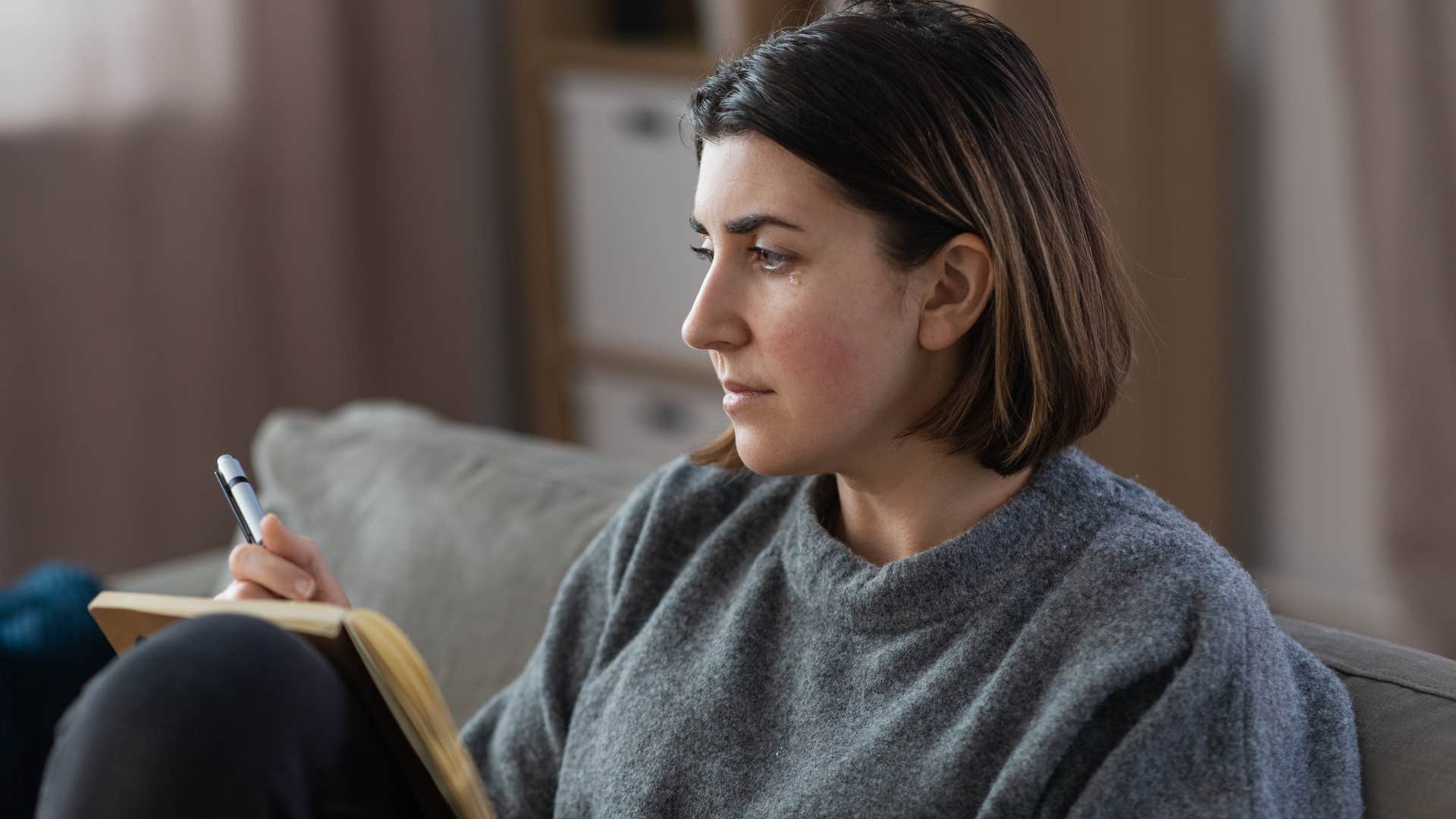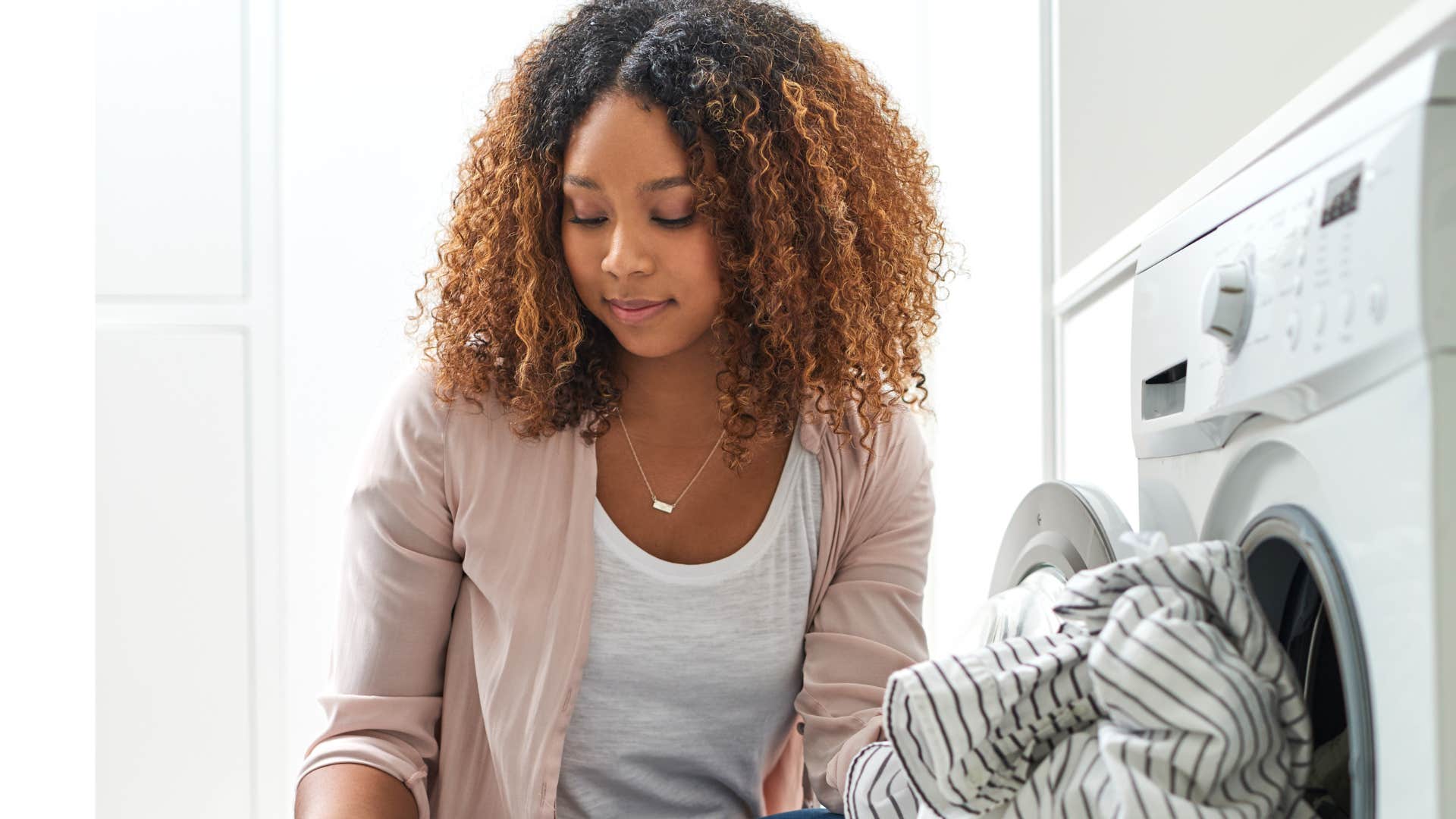11 Brilliant Ways Introverts Make The Most Of Their Alone Time
Introverted people enjoy solitude for many reasons.
 Olga Kri | Shutterstock
Olga Kri | Shutterstock Compared to extroverts, who tend to fill their social battery in social situations and interacting with others, introverts are well known for needing solitude to truly unwind and recharge. There are even people who switch between introverted and extroverted tendencies depending on the social situation and their comfort level, according to one study from the Journal of Personality. So, having the tools to leverage their introversion when it comes to the surface is necessary for recharging.
Many of the brilliant ways introverts make the most of their alone time not only drive their personal well-being, from their mental health to their physical state, it also ensures they're able to have healthier, more meaningful social connections when they do leave their home. So, even if you're not an introvert, chances are some of these hobbies, habits, and behaviors will still positively influence your routine, if you can find the time for solitude amid the chaos of being a social butterfly.
Here are 11 brilliant ways introverts make the most of their alone time
1. Journaling for self-reflection
 Syda Productions via CanvaPro
Syda Productions via CanvaPro
For introverts, who may struggle to express their needs, vocalize their feelings, and even regulate their emotions in social interactions, finding time for self-reflection is necessary to unpack everything from the day. For some people, that solace comes from movement when they're home, mindfulness practices like meditation, or even journaling to truly come to terms with struggles, interactions, and emotions from their routine.
While many introverts do enjoy social interactions, they still tend to have a preference for solitude at the end of the day. They're comfortable with their inner monologue, thoughts, and feelings, so turning inward to make space for acknowledging them is much easier than it is for many extroverts, which is why the practice of journaling is so impactful for their well-being.
They have a chance to fully voice their thoughts without combating social anxiety, conversation dynamics, or social cues. They can sit with themselves and fully embrace the vulnerability that may be harder for them to tap into when they're around others.
2. Tapping into their creativity
 PreciousJ | Shutterstock
PreciousJ | Shutterstock
There's a tangible connection between cognitive ability, intelligence, and creativity, which is why introverts who tend to be more emotionally intelligent and self-aware also embody general cognitive abilities like memory and concentration, alongside creative endeavors and pursuits.
They leverage their alone time as a chance to tap into that creativity, whether it's actually artistic endeavors like painting, drawing, or making pottery, or more subjective routes like making music, cooking, or moving their bodies.
Every one of the brilliant ways introverts make the most of their alone time is rooted in intentionality. They're engaged in hobbies, performing certain activities, and engaging in behaviors with an intention, even if it's just entertainment or clarity.
3. Learning new skills
 PeopleImages.com - Yuri A | Shutterstock
PeopleImages.com - Yuri A | Shutterstock
Many of the brilliant ways introverts make the most of their alone time is by crafting experiences and behaviors that extroverts are able to seek through sociability and new interactions.
For example, networking with strangers at a conference or having conversations with strangers is equally energizing and thought-provoking for extroverts. They gain perspectives, learn new skills, and walk away feeling more fulfilled.
However, those kinds of conversations can feel draining to an introvert, which means finding opportunities and crafting spaces for them to soak up knowledge, perspectives, and new skills when they're alone is key. It just looks a little bit different for introverts.
They're connecting with people on their phones, engaging in new hobbies and activities, or even unpacking their emotions in a journal where they can make new connections and revelations.
4. Finding solace in nature
 EugeneEdge | Shutterstock
EugeneEdge | Shutterstock
A great deal of research has shown the benefits of nature on the human psyche and emotional state. We're not only happier and less stressed when we're outside and immersed in nature, we're more present and intuitive.
Introverted people find solace in nature because they have a chance to look inward and connect with themselves. They don't need casual conversations or superficial interactions to seek out the praise and validation they can simply give to themselves in a moment of solitude.
5. Using mindfulness to reduce stress
 Miljan Zivkovic | Shutterstock
Miljan Zivkovic | Shutterstock
Meditation or mindfulness practices are one of the brilliant ways introverts make the most of their alone time. They not only train themselves to look inward and sit with their present state, emotions, and feelings, they accept themselves and all of those things as they are. Even if it's a work in progress, introverts find a bit of stress relief and calmness in their solitude, even if every other part of their life feels chaotic.
While extroverts or other social people may find alone time to be uncomfortable or draining, the opposite is true for introverted people. It's a key part of their routine when it comes to de-stressing, coping, and healing.
6. Thoughtfully planning their routine
 Dorde Krstic | Shutterstock
Dorde Krstic | Shutterstock
Organization, planning, and intentional scheduling are some of the brilliant ways introverts make the most of their alone time. Even if they find social interactions overwhelming or simply draining, they're very intentional about planning them out and ensuring they have space to recharge, even amid a chaotic schedule.
Whether it's a Google Calendar, a page of their journal, or a laundry list of "to-do's," introverts are planners. They feel anxious when they don't have some kind of idea of the tasks at hand, and can further retreat into themselves as a result.
7. Listening to podcasts and audiobooks for perspective
 DimaBerlin | Shutterstock
DimaBerlin | Shutterstock
Even if they're not learning other people's perspectives from conversations and social interactions to the same degree as extroverts, turning to podcasts, audiobooks, and other thoughtful forms of media is one of the brilliant ways introverts made the most of their alone time.
According to experts from Piedmont Healthcare, learning something new — whether it's an internal emotional revelation about yourself or a tangible skill — can help to improve internal confidence, emotional health, and well-being.
Even if it's listening to a podcast that urges you to unpack certain emotions or an audiobook that gives you the perspective to try a new hobby you've never done before, they're some of the brilliant ways that introverts make the most of their solitude to show up better in other aspects of their lives.
8. Recharging their social battery
 fizkes | Shutterstock
fizkes | Shutterstock
The key to truly recharging your social battery as an introvert isn't to find hobbies and practices that simply entertain and distract you from internal thoughts and emotions, but energize you to come to terms with them.
For example, going for a walk outside, practicing some kind of mindfulness exercise like yoga, or journaling in bed at the end of the day are perfect ways to easily connect with yourself, without having to get completely outside of your comfort zone.
9. Unpacking their need to set boundaries
 PeopleImages.com - Yuri A | Shutterstock
PeopleImages.com - Yuri A | Shutterstock
While there are a number of practices — like journaling, movement, or even mindfulness techniques — that can help introverts to acknowledge and understand their unique needs, it's often easier for them to get in touch with their inner thoughts and feelings when they're alone.
When it comes to setting boundaries and having sometimes uncomfortable conversations, leveraging their alone time is critical for introverts to plan out what they want to say and come prepared to advocate for themselves.
It's not always easy to unpack your emotions and understand your needs when you're around other people, especially for introverts that feel pressured to put a lot of thought into reading social cues, mirroring body language, and being active listeners to the people they're speaking to.
10. Decluttering for clarity
 PeopleImages.com - Yuri A | Shutterstock
PeopleImages.com - Yuri A | Shutterstock
According to psychologist Rachel Goldman, PhD, too much socialization, anxiety struggles, and overstimulation can often cause unnecessary stress in an introvert's lives, which is why daily practices and rituals like decluttering their home or cleaning up the mess of the morning is essential for de-stressing.
Even taking a mindful shower and cleaning themselves is shown to have an impact for mitigating this stress and anxiety, according to a study from Social Physiological and Personality Science.
So, even if they may already be an important and consistent part of everyone's routine — regardless of their introversion or extroversion — showering, decluttering, and cleaning their space are some of the brilliant ways introverts make the most of their alone time.
11. Practicing gratitude
 Jose Calsina | Shutterstock
Jose Calsina | Shutterstock
According to experts from Harvard Health, expressing and practicing gratitude on a daily basis can drastically improve mental health, general happiness, and mood, helping introverts to build their self-esteem and protect their internal well-being before entering the world and engaging in social interactions.
Another study from JAMA Psychiatry suggests that practicing gratitude is essential for safeguarding internal physical health as well, protecting people from a range of different physical ailments and illnesses, like cardiovascular disease, compared to people not taking the intentional time to do so.
So, not only are introverts recharging their social battery and safeguarding their mental health by taking the time to journal about the things they're grateful for or reaching out to loved ones to say "thanks," they're also protecting their physical well-being.
Zayda Slabbekoorn is a staff writer with a bachelor's degree in social relations & policy and gender studies who focuses on psychology, relationships, self-help, and human interest stories.

